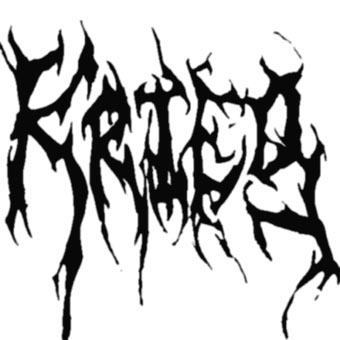 Krieg emerged at a time when few New World black metal bands had made a name for themselves, and none had come up with an iconic style to match the distinctively “Scandinavian” attributes of the founders. Raw and reckless, chaotic and vitriolic, early Krieg was like a fusion between primitive black metal and noise, but over time the band has matured and gotten closer to its shoegaze and drone-rock roots. Frontman Imperial gave us the skinny on life, the evolution of Krieg, and metal as an art form in this exclusive interview from his Western New Jersey headquarters, a former Nike missile site that’s now a converted studio and hydroponics lab.
Krieg emerged at a time when few New World black metal bands had made a name for themselves, and none had come up with an iconic style to match the distinctively “Scandinavian” attributes of the founders. Raw and reckless, chaotic and vitriolic, early Krieg was like a fusion between primitive black metal and noise, but over time the band has matured and gotten closer to its shoegaze and drone-rock roots. Frontman Imperial gave us the skinny on life, the evolution of Krieg, and metal as an art form in this exclusive interview from his Western New Jersey headquarters, a former Nike missile site that’s now a converted studio and hydroponics lab.
How did you get involved in playing music?
When I was much younger I decided I didn’t really have the usual interests of cars, sports and television that the majority of American kids had so I started getting deeper and deeper into music. Both of my parents were very deeply into music and literature though neither of them played any sort of instrument that I know (they’re both dead so I can’t call and ask). I picked up the guitar around age 14, the same time death and black metal swiftly entered and controlled my life. I guess in the sense that the ’77 British movement said “if you think you can do better, start your own band” I had a similar mindset and started an early primitive project called Impaled which recorded a demo that would make Anal Cunt seem musical. After this I helped form Abominus which was a death metal band that with enough rehearsing could’ve sounded like Belial’s Never Again and Krieg’s first draft Imperial.
What got you into metal?
I always liked guitar oriented music and being a child in the 1980s it was either that or the tail end of the New Romantic movement which I didn’t like or understand. Deeper appreciation grew once I hit high school and discovered a college station that had a lot of harsher metal which opened a lot of doors for me mentally. I still vividly remember hearing Darkthrone and Samael for the first time through this show as a sophomore.
If you could identify your primary influences, what would those be?
It changes a lot. I soak up a lot of influence from the music I constantly listen to but I guess I’d say in the beginning it was mostly Beherit, Profanatica, Darkthrone, Forgotten Woods and the first few Demoncy records. These recordings still get a lot of play around my house. Judas Iscariot obviously became a strong reference point for me in the late 90s and since then I’ve added a lot of stuff like Black Flag, Public Image Ltd and The Velvet Underground into the writing.
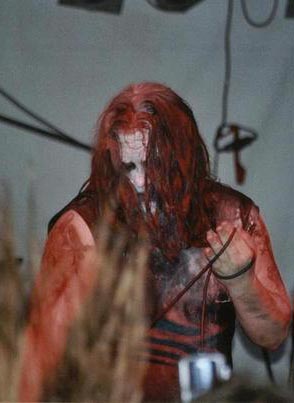
Have the values and sound of metal music changed from the 1980s? How and why?
There seems to be more of an intellectual awakening amongst a majority of bands. The 1980s created the foundation and I guess stuff like Municipal Waste never really grew out of that. I want to say that something like the late 80s/early 90s indie and Sub Pop scene helped change a bit of that but a majority of metalheads abhor that stuff but you can clearly hear it in some of the newer bands that utilize more rock and roll or shoegaze soundscapes. Values have changed in that I feel a lot of the vapid ideas of the 1980s are disintegrating, people want more meaning out of their art and entertainment (though this is just a small grouping, this theory is obviously proved wrong via Hollywood, MTV and pop music which views art as commodity-an extension of the 1980s “Me Generation” that’s fucked things up for the rest of us). I personally think a lot of the US metal bands are starting to show this sort of introspection or are at least reaching for new heights with it.
Can you give us a run-down of your history as a musician?
I guess I’ll try to do it chronologically as best as I can: The early 1990s I spent failing at learning guitar and bass, which is obvious in my early records. I was a member of Abominus (94-97) Imperial/Krieg (95-current) Devotee (98-00) AngelKunt(00-02) Twilight (04-current) March Into the Sea (06-08) and N.i.l (06-current). These are all the projects I had something to do with the musical writing side of things. I’ve done lyrics and session work for several other bands as well.
Was early Krieg material actually improvised in the studio?
About 75% of it. The Imperial demo stuff was written beforehand but Rise of the Imperial Hordes we recorded without a drummer or a label. These were added later. Destruction Ritual, except for the older songs on the record, was all improvised in studio. Originally we did it because we didn’t know what to really do in a studio environment that wasn’t a 4 or 8 track. Destruction Ritual was just meant to be unlistenable and punishing.
Do you believe black metal is still a viable form of music?
Difficult question. With the advent of Myspace and computer recording you have a deluge of bullshit meaningless noise, moreso than the days of mp3.com and the initial CD-R craze. But there are still plenty of artists out there whom write and record with thoughtful intentions and sincerity, even if I don’t personally find their music interesting I still respect anyone dedicated truly to their art. You’ll always have throwaway bands who form clubs with other throwaway people and that exists in any genre of music. One man’s unlistenable derivative garbage is another’s kult ebay record. I don’t think black metal will ever be a shocking or culturally substantial form of expression to the multitudes since we have such a desensitized and moral society. Plus it’s still a fad to some kids who’ll move on to EBM or the Dave Mathews Band a few months later.
What, if some day or night a demon were to steal after you in your loneliest loneliness and say to you: “This life as you now live it and have lived it, you will have to live once more and innumerable times more; and there will be nothing new in it, but every pain and every joy and every thought and sigh and everything unutterably small or great in your life will have to return to you, all in the same succession and sequence– even this spider and this moonlight between the trees, and even this moment and I myself. The eternal hourglass of existence is turned upside down again and again, and you with it, speck of dust!”
Would you not throw yourself down and gnash your teeth and curse the demon who spoke thus? Or have you once experienced a tremendous moment when you would have answered him: “You are a god and never have I heard anything more divine.” If this thought gained possession of you, it would change you as you are or perhaps crush you. The question in each and every thing, “Do you desire this once more, and innumerable times more?” would lie upon your actions as the greatest weight. Or how well disposed would you have to become to yourself and to life to crave nothing more fervently than this ultimate eternal confirmation and seal?
– F.W. Nietzsche, The Gay Science (1882)
What distinguishes great music from bad? Can it be distilled into technique, or is it something less easily defined?
Technique is for school and Dream Theater. Some people find that sort of “note note note note solo note etc” music to be the greatest thing since the Fleshlight but I define great music as something that emotionally moves me, captivates me and forces repeated attention. Anyone can learn to play well, not everyone can write something worth hearing. We all learn to read and write but not everyone is Charles Bukowski or Knut Hamsun. Same goes for all art form.
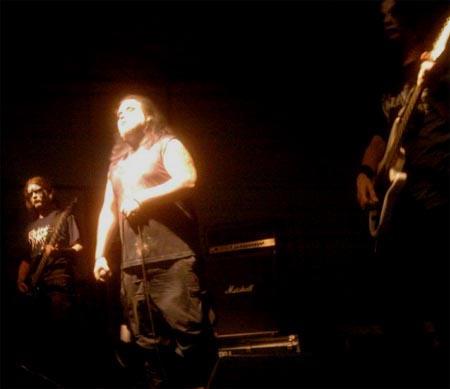
Can a heavy metal culture augment or express aspects of a parent culture (like say, “American culture”), and have you seen examples of this?
I don’t know. Metal is an outsider thing for the most part, only recently has black metal spread outside its confines and a lot of that has to do with ironic hipsters and curiosity seekers. It seems metal goes two ways: one is that it expresses the “American dream” if you will, of loud music, lots of girls, alcoholism and patriotism which is normal American behavior (loud music turns to loud Bruce Springsteen, girls to either being a dead beat dad or responsible parent, alcoholism to your uncle who gets smashed at Thanksgiving and hits on the 15 year olds, patriotism to a belief that goverment is always correct = American as fucking McDonalds) or the other way which is an absolute rejection of societal norms, creativity not taught or nurtured at (public) schools and, if stuck with, a lot of interesting ideas and art which could one day channel into a real movement for change.
Did you ever study music theory or take lessons? Did this help you or slow you down in achieving your musical goals?
I’m horrible with math so theory always confused me. I did try lessons when I was younger and long time listeners see how that went. I’m more of the idea that self teaching and free form idealizing without the aid of constriction breeds the most challenging and interesting art and could lead to innovation. It also leads to horrible Myspace bands so this is more of a personal experience for me.
Some have said that rock music is about individualism, or escaping the rules of society and nature to do whatever the individual wants to do. However, some have also said that heavy metal breaks with that tradition with its “epic” and impersonal view of life. Where do you fit on the scale?
No one is still swinging hammers at invaders inside their castle walls. I’m more of the philosophy implied by the 1970s rock critics like Griel Marcus or Lester Bangs that rock (which all metal is derived from) should be more of a personal introspective experience. This is why a band like Amebix will always greatly fascinate me more than say Crass (which is a weak example but the first to come to mind) in that it’s more personal than collective. I have enough mental problems that don’t see to be going away anytime soon regardless of what new medicine my doctor switches me to every few months to keep my writing process outside of the open sphere of religious icons and impending doom for a long time. This wasn’t always the case since Rise of the Imperial Hordes and my demos were more based on traditional war topics, but I was only fucking 17 at the time.
When Hellhammer said, “Only Death is Real,” it launched legions of death metal and grindcore bands who showed us through sickness, misery and sudden doom (in their lyrics) that life is short, manipulations are false, and we need to get back to reality. Where should the genre go from there?
I don’t think that’s a bad thing to be fixated on. Looking at the majority of philosophy books in any chain store and you’ll see this topic isn’t restricted to metal alone and is something that will never be answered. I’d like to see the genre go into more of a intelligent approach but certain subgenres don’t allow that. Plus a lot of people would be at a loss if they couldn’t sing about goats.
Is there a relationship between how an artist sees the world, and the type of music he or she will then make? Do people who see the world in similar ways make similar music?
I think some of it has to do with age. When you’re young you are more rebellious and questioning and angry. Whether this subsides once life lines up for you with a mate, employment and house can say a lot about if an artist will even continue to create. Now once you’ve got that out of the way (or if it never lined up for you in the first place) and you still have those emotions and see the world the same (or if your worldview has grown with you and disgusts you ever more once you know more about it) then it definitely affects the way you make music. Personally in my close circle of friends who see the world in a similar grey light, we all tend to gravitate towards the same kind of ideas and music hence Twilight’s reformation or my strong involvement with certain people. Is this universal? I’m not sure, isn’t it how scenes are created?
Your music seems to attempt to be ritual music, where a play or ceremony shapes the transitions in each song. Did you have a ceremony in mind?
Emotional disrupting. Even more so now that I’m working with different time changes and unexpected stop/starts. The ritual of discomfort.
Within the tiny space occupied by a note or a colour in the sound- or colour-continuum, which corresponds to the identity-card for the note or the colour, timbre or nuance introduce a sort of infinity, the indeterminacy of the harmonics within the frame determined by this identity. Nunance or timbre are the distress and despair of the exact division and thus the clear composition of sounds and colours according to graded scales and harmonic temperaments…The matter I’m talking about is ‘immaterial,’ anobjectable, because it can only ‘take place’ or find its occasion at the price of suspending these active powres of mind. I’d say that it suspends them for at least ‘an instant.’ However, this instant in turn cannot be counted, since in order to count this time, even the time of an instant, the mind must be active.
So we must suggest that there is a state of mind which is a prey to a ‘presence’ (a presence which is in no way present in the sense of here-and-now, i.e. like that which is designated by the deictics of presentation), a mindless state of mind, which is required of mind not for matter to be perceived or conceived, given or grasped, but so that there be some something. And I use ‘matter’ to designate this ‘that there is’, this quod, because this presence in the absence of the active mind is and is never other than timbre, tone, nuance in one or other of the dispositions of sensibility, in one or other of the sensoria, in one or other of the passibilities through which mind is accessible to the material event, can be ‘touched’ by it: a singular, incomparable quality – unforgettable and immediately forgotten – of the grain of a skin or a piece of wood, the fragrance of an aroma, the savour of a secretion or a piece of flesh, as well as a timbre or a nuance. All these terms are interchangeable. They designate the event of a passion, a passibility for whih the mind will not have been prepared, which will hvae unsettled it, and of which it conserves only the feeling – anguish and jubilation – of an obscure debt.
– Jean-François Lyotard, The Inhuman (1991)
When you write your music, how do you avoid repeating the past 15 years of black metal?
I just don’t pay attention to it. I experiment with riffs and keep what I feel represents me as a whole. If someone feels it’s derivative or cliché it’s not my problem and they can go listen to something else. I havent bought any new black metal in close to a year outside of the new Urfaust and Vohlahn.
When you write songs, do you start with a visual concept, or a riff, or something else?
Overall I start with a visual idea of how I want to feel through what I’m writing. Mostly colours which explains the last two album names. Sometimes I’ll have a phrase in mind and I try to put the emotion behind the phrase to use through the guitar and if that doesn’t work I’ve regressed to using my power electronics setup to try to create a background that I can build a suitable song structure through. If that doesn’t work I get up, smoke a cigarette and find some coffee, sit down and start over again. There have been times when I’ve dreamt of ideas and had to rush out of bed at 4 am down to my rehearsal area and put it to work. Lyrics are done in a similar fashion though I generally these days write pages and pages of lyrics then using the cut up method piece them together into some sort of abstraction that may not make sense to others but perfectly suits what I’m thinking.
How has Krieg changed over the years? You as an artist have changed as well — can you give us a rundown on your newer projects, and what you’re attempting to do with each?
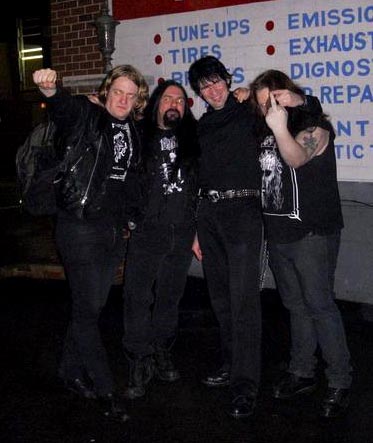 There has been three phases of Krieg: 1995-2002 which was more of a primitive beginning forged into a noise ending ala Whitehouse if they were a black metal band. Patrick Bateman was the end of this phase in which I felt I could do no better with creating harsh sounds. 2002-05 which might have been the busiest time for me was when I figured I could write emotive pieces but my guitar skills were lacking so I employed friends to help bring these visions to light.
There has been three phases of Krieg: 1995-2002 which was more of a primitive beginning forged into a noise ending ala Whitehouse if they were a black metal band. Patrick Bateman was the end of this phase in which I felt I could do no better with creating harsh sounds. 2002-05 which might have been the busiest time for me was when I figured I could write emotive pieces but my guitar skills were lacking so I employed friends to help bring these visions to light.
Riffwise not a lot changed between Destruction Ritual and Black House, it’s just that with a full band and decent recording the music became its own new form. My interests in other music like the 1970s NYC art scene came pouring in and I stopped limiting myself to traditional black metal topics and focused on what was important to me. By 2005 I was an emotional wreck, ruined my label and reputation and went out in a drink fueled bang at Under the Black Sun. 07-now is phase three which is a melding of ugliness and beauty so far. I’ve only recorded two songs, the track for the split with Caina and a cover of the 1980s noise/punk band Flipper. We plan to record in 2010 depending on when the label is ready to announce shit and get the ball rolling.
Other projects: The only active ones are N.i.l which just finished recording a 3-song MCD which we’re shopping to labels once it’s mixed. Our first record came out on Battle Kommand in 2007 and I think a lot of people missed the point that we were actively emulating Strid and My Bloody Valentine. Most people thought it was just too simple or monotonous but that was the intention: it was more of a trance record than something to play at parties. We did get to play live with Profanatica last year but sound problems fucked up a bit of the show. Ledney and Gelso dug it though and that was important.
I’ve also just finished vocals and a majority of the lyrics for the new Twilight record which is worlds beyond our first effort. This time it was done in a real studio and the writing was mostly Blake Judd, Wrest and myself musically and lyrically. Vocally I’ll be a pretentious asshole and say it’s the best I’ve ever done.
I’m also doing vocals for John Gelso’s project Royal Arche Blaspheme which I’ve done three songs for so far. I think I’m still involved with The Red Cathedral which is myself and Andrew from Caina plus some others but it’s sporadic at best. Should be interesting when it’s completed.
I’m also working on Apothecary.Sound.Lodge which is power electronics and black metal but it’s taking forever and due to finances being what they are probably will take even longer.
What are the goals of your art? Is there a goal to art itself?
To keep me from killing myself. Artists may say their goal is to improve humanity’s thoughts and ideas but the cynic in me thinks it’s because they want something of theirs to remain when they’re dead. True immortality.
Jim Morrison (The Doors) sang and wrote repeatedly of a “frontier,” or a chaotic no man’s land where danger was everywhere, but it was also possible to get away from rules and fears. How does this apply to music like death metal, which seems to accept death and disease as a normal part of life?
I don’t think a lot of people who sing about this subject really desire it to be a normal part of life because they wouldn’t know how to deal with it. Everyone desires security to some extent (though I can’t speak for everyone) and to have that taken away, I don’t know how they would handle it. Jim Morrison on the other hand obviously lived this and died for it, proving that there are people living this idea. Utopia is just a manmade idea to try to comfort you when you’re going to sleep. Only desperate people really live to experience this idea.
Like in the late 1970s, metal feels to many people like it has lost direction and become hollow. Is a change in direction needed, and if so, will that come from within metal?
The late 70s also brought the creation of punk, post punk and some interesting literature and art. But this is different now with things like MTV reality TV and other forms of cheap entertainment to keep people from growing and realizing what a fucked up world they live in. The recession might spur some change in ideas but I’m afraid that in Western culture we might be too deeply embedded in instant gratification and plastic living to really benefit from such a shift in life’s paradigm. I think much of the world thought with last year’s presidential election we’d have some kind of light shed on us telling us where to go but this shit takes time.
I read an interesting essay a few weeks back about how people who are unemployed or poverty stricken (just above lower middle class, this obviously won’t account for homeless people or those on social support) should take this time to do what they truly love in life, start painting or writing like they always dreamt. It’s a beautiful sentiment but we as a culture are so dependent on building our DVD collection and buying a fucking hi def TV that we’re more concerned with that outlook.
I’ve strayed a bit from topic; will metal help change this? It gives people an outlet to express their rage at things they cannot control at a constructive level rather than turning to the bottle or needle. It can also help them look at things from a different perspective. Christ that’s a lot of positivity from me.
It seems obvious to me, when all factors are added up, that our society is in decline. However, this opinion is not widely shared. Why do you think this is?
To keep the suicide rate down so the IRS can collect more money.
William Blake says, in perhaps his most memorable line, “The cut worm forgives the plow.” What does this mean to you?
Sounds like turning the other cheek to me. In 9 out of 10 cases this is a worthless idea. There’s some specific people who rightfully deserve to knock my teeth out and there’s a few who deserve it from me. Forgiveness is a mostly outdated idea unless in minor cases, like someone accidentally broke something minor of yours or got drunk and said something they regret. I see no virtue in forgiving someone who robbed you, fucked your wife or killed your animals.
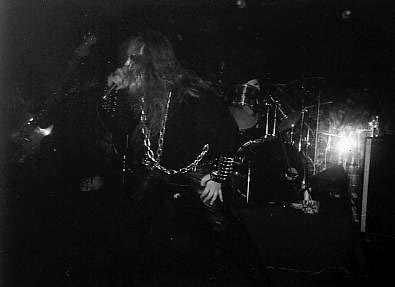
How has Krieg changed over the years? Is interest still high, and in what era of your material? What’s next for you and Krieg?
It’s evolved like I have. My writing style is still very similar and my aesthetic visually hasn’t changed. Interest I suppose is still strong though I haven’t paid much attention. We’ve done about 8 shows since reforming and some have been amazingly excellent events like our shows in Brooklyn and Rhode Island this past winter, others have been poorly put together messes like the fest we did over the summer. It seems people either love Black House/Blue Miasma or hate that and only want to hear Destruction Ritual. After close to 15 years you can’t really please everyone and it’s not my intent to do so. I’ve always done Krieg because it’s something I’m driven to do and I don’t see that drive going away soon.
Besides the aforementioned split 7 inch with Caina we’ve recorded songs for splits with Gravecode Nebula, an excellent doom band, and Shining. There have been two unofficial LP releases of Black House and Blue Miasma but the official Blue Miasma with bonus tracks, original artwork and linear notes will come from Hammer of Hate (FI) and we’re signed for our next record The Isolationist though the official announcement hasn’t been released yet. We have some shows coming up in the US and maybe in 2010 we’ll go back to Europe. Since these splits will be the last split releases we’re able to do, I’ll probably concentrate on other projects during the downtime between albums.
Thank you for taking the time to talk to us.
As always thanks for the support!
Making time public does not occur occasionally and subsequently. Rather, since Da-sein is always already disclosed as ecstatic and temporal and because understanding and interpretation belong to existence, time has also already made itself public in taking care. One orients oneself toward it, so that it must somehow be available for everyone.
– Martin Heidegger, Being and Time (1926)

